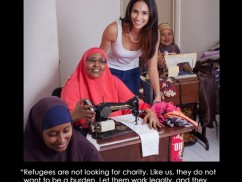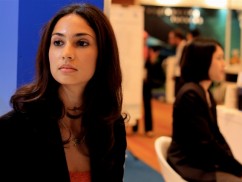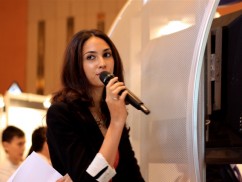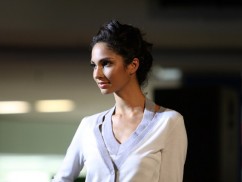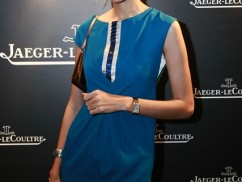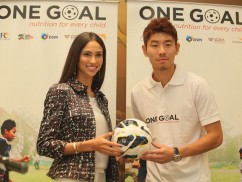Many pretty faces have adorned the covers of newspapers and magazines across the region, but few have traded the glitz and glamour of the high life for worthier causes. Manveen Maan speaks to a former beauty queen who is not afraid to get her hands dirty for her charitable ventures.
All That Glitters
“Only a few more days and I won’t have to worry about wearing makeup anymore.” Not a quote you would expect to hear from a beauty queen, but then, Deborah Henry is no ordinary tiara princess. Along with the usual tags of model, emcee, and actress, Deborah has another vocation that defines her working life: humanitarian.
Her life story reads like a girl destined for stardom. Born in Dublin, growing up in Malaysia, modelling in London and attending university in Australia, it was only a matter of time before her Irish-Indian bone structure landed her a place in the Miss Malaysia pageant. “I was very lucky that my parents trusted me to leave at such a young age,” she tells me over the jazzy music in a Bangsar cafe. “I lived with my aunt for a while before getting my own room. It was scary but having that independence was so much fun. Once I got back from university though, my thoughts were more solidified and I felt strongly about getting involved with a cause.”
Enter the pageant. Articulate and elegant, Deborah stood head and shoulders above the rest to claim her victory in a venture that came rather unexpectedly. “I fell into the beauty pageant world,” she confesses. “If you had known me back then, I was so anti-pageants. But all my modelling and pageant friends convinced me to give it a go. It really is an amazing platform, and if you know what you can achieve from it, you can do great things. It’s about finding your niche; a lot of beauty queens don’t do that.”
Passion For The Cause
As fate would have it,World Vision was the beneficiary of the pageant that year, marking the start of a working relationship that still thrives today. In 2008, Deborah was approached by the UNCHR to shoot an in-house documentary surrounding the refugee situation in Malaysia. “That really sparked my interest,” she says, her eyes lighting up. “My mum was an educator and so is my sister, so we talked about these issues in our home often, from the time we were little, and we understood the importance of it. When I came into contact with the refugees here, it hit a nerve and I just couldn’t walk away.”
Once introduced to the community, Deborah realized the difficulties they face. “Children can’t attend formal school, and adults can’t work. It’s a paralyzing situation; they’re almost imprisoned to an extent, in their own homes,” she says. “As Malaysia is not part of the (UN Refugee) convention, there are security issues that refugees have to deal with as well.”
Undeterred, Deborah (and her university friend Shikeen) started giving Somali refugee children English and Math tuition in their homes. Word spread quickly within the close-knit community, and more classes ensued, eventually leading to the birth of the Fugee School in May 2009: “We really just stumbled along.We had fundraisers and paid for equipment along the way, so we really just winged it,” she laughs. “It’s been a blessing. If we needed things, it came to us.The intention was a pure one, so maybe karma helped us out.”
Housed within the same apartment building as the refugee settlement, the Fugee School now has 110 children enrolled in classes.The kids learn English, Math, Somali language, arts, sciences, and co-curricular activities. “It is not just an academic focus; there are also physical and creative aspects. We try to give them an all-around approach,” the Economics and Political Science graduate says. “We try to get them switched on; to have a dream or a goal, to learn discipline and manners. We want to give them the opportunity to make that dream a reality.” The Fugee School’s role goes beyond just education. “When resettling happens, we want the children to be able to fit in,” explains Deborah. “These kids often come from a conservative war-torn city, transit in Malaysia, then move to the more-liberal West. We want to teach them to hold on to their values, but show them the necessity in adapting to change.”
And what a job they’ve done. Deborah cites the stellar progress reports of her students in their new environment as particularly rewarding. “The amazing thing is that even with very little, the potential is huge for these bright kids. Despite war and other obstacles that could cripple a child, they still come out with a sense of worth,” she marvels. “At such a young age these kids really understand the value of education, whether they’re in Somalia, Malaysia, Australia, the US or anywhere else.”
Paying It Forward
Being thrown into the deep end of things, Deborah and her team have had to sink or swim, working through language barriers, bureaucratic red tape, and prejudice within the system itself. However, she feels it is all worth it at the end of the day. “There are ups and downs of course. But I think the bittersweet moments are what gets me most,” she says. “I asked one of our 11-year-olds if he was excited to be going to NewYork for resettlement. He answered that he was, but would miss his school terribly. At that moment, if I hadn’t held it all together, the waterworks would’ve started!”
Despite the sentimental attachment, her determination to make a difference is apparent: “I love seeing how far they’ve come. They have tenacity in them that no one can take away.” Her life of being the apple of the media’s eye has not diminished her passion either. “Nothing helps you to feel or understand a cause quite like putting yourself in that situation. When our lives are busy, it’s easy to get disconnected; you lose touch with reality. Staying involved keeps your feet on the ground, and it strengthens your beliefs,” she says vehemently.
Outside of her work at the Fugees School, there have been some trying moments for Deborah within her role as humanitarian. A recent trip to Lebanon proved especially heartbreaking for her. “I went as part of World Vision and heard about a mother walking into Lebanon and somehow a stray bullet had hit her child. She carried her dead child in her arms for the remainder of her journey before crossing the border. It was just horrific,” she recalls. “When you hear these tales, you feel so powerless. But the one thing you can do is share their story, and that’s become my responsibility. If someone hears about this and is impacted by it, something positive may come about. That is all I can hope for.”
In spite of all the negativity in the world, Deborah remains hopeful about the future, and believes in cultivating the next generation. “No child should be deprived of education. You can essentially destroy or totally change a generation through it.” Before she leaves, I ask Deborah if she has anything she’d like to stress. With a steely gaze on her flawless face she replies: “These kids are empowered. I want people to see that. They are smiling and motivated. That is how important education is.” And with that, Malaysia’s sweetheart ends the conversation, the conviction in her words ringing loud and clear over the jazzy din of the café.
For more information on the Fugee School, please visit www.fugeeschool.com or like their Facebook page.
Source: Senses of Malaysia January/February 2014
Read more:
- A Sudanese Man’s Perseverance to Bring Water to South Sudan (Part 2)
- An Afternoon with the South African Ambassador to Malaysia
- Building a Greener Malaysia
What are your thoughts on this article? Let us know by commenting below.No registration needed.
"ExpatGo welcomes and encourages comments, input, and divergent opinions. However, we kindly request that you use suitable language in your comments, and refrain from any sort of personal attack, hate speech, or disparaging rhetoric. Comments not in line with this are subject to removal from the site. "



